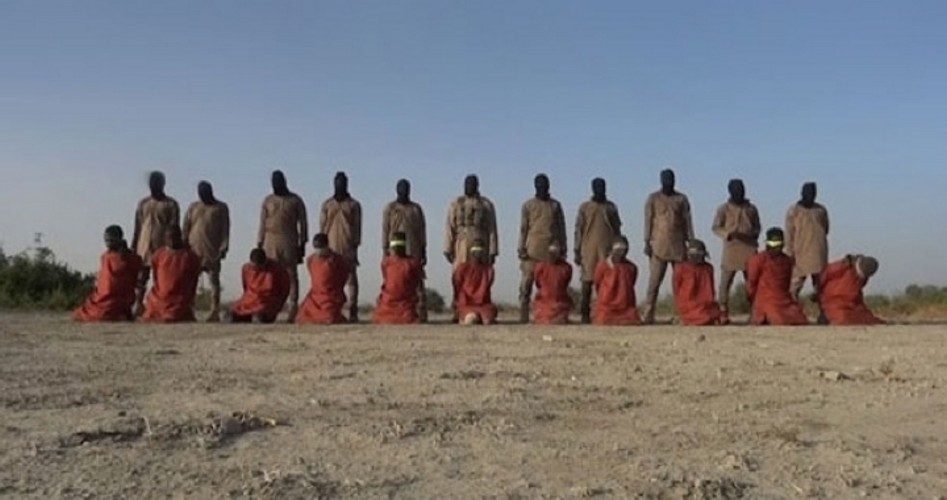
The videotaped execution of 11 Nigerian Christians, released December 26 by the Islamic thugs responsible, has added to the over one thousand Christians martyred in the West Africa nation during 2019.
The nearly one-minute video showed members of the Islamic State in Nigeria “slashing the throats of 10 people and shooting an additional person,” reported the New York Times. The ISIS group claimed that the murders were in retaliation for the earlier deaths of two radical Islamic leaders, Abu Bakr al-Baghdadi, the ISIS caliph killed during a U.S.-led raid in Syria in October, and Abu al-Hassan al-Muhajir, another ISIS leader killed the next day.
“This message is to the Christians in the world,” a man’s voice said on the video, speaking in both Arabic and Hausa, a Nigerian dialect. “Those who you see in front of us are Christians, and we will shed their blood as revenge for the two dignified sheikhs, the caliph of the Muslims, and the spokesman for the Islamic State, Sheikh Abu al-Hassan al-Muhajir, may Allah accept them.”
The latest killings come just weeks after a British relief organization, the Humanitarian Aid Relief Trust (HART), released a report estimating that more than one thousand Christians have been killed over the past year by Fulani Muslim extremists. While the exact number of those killed is unclear, “preliminary data suggests that over 1,000 Christians have been killed since January,” reads the report, adding that more than 6,000 Christians have been slaughtered since 2015, with 12,000 more displaced from their homes and villages.
The report charges that “Islamist Fulani militia continue to engage in an aggressive and strategic land grabbing policy in Plateau, Benue, Taraba, Southern Kaduna and parts of Bauchi state. They attack rural villages, force villagers off their lands and settle in their place — a strategy that is epitomized by the phrase: ‘your land or your blood.’”
Baroness Caroline Cox, a member of the UK Parliament and founder of HART, recounted that she had visited many of the areas where the attacks have taken place, and “seen the tragedies of death and destruction. In every village, the message from local people is the same: ‘Please, please help us! The Fulani are coming. We are not safe in our own homes.’”
The predominantly Muslim Fulanis are a nomadic people some 20 million strong across West and Central Africa, who have “come under tension with farming communities as the scarcity for land gets greater and the human populations get larger,” reported the Christian Post. “While farmer-herder clashes are nothing new; the violence carried out against farming communities has increased in severity as thousands have been killed in the last several years.”
The HART report includes the testimonies of Nigerian Christians impacted by the violence, such as a 38-year-old female villager who recounted that “our home is destroyed. The hospital was burnt. They tried to burn the roof of the church by piling up the chairs, like a bonfire. Life is frightening. We sometimes receive messages of a renewed attack. So we run to hide. We have no means of defense. We don’t have weapons to defend ourselves. There is no kind of security or vigilante support.”
A Nigerian pastor testified that the violence at the hands of armed Islamists had become a nearly daily occurrence. “Every day we carry new corpses to the cemetery,” he said. “They kill farmers, they destroy our homes and churches. They kidnap and rape women.”
According to the Christian watchdog group Open Doors USA, Nigeria ranks as the 12th worst nation in terms of violence against Christians.
Among other efforts to bring the attacks to a halt, Cox has called upon Britain’s Foreign Office to “ensure the Nigerian government takes effective action to protect all its citizens and call to account those who perpetrate atrocities.”




